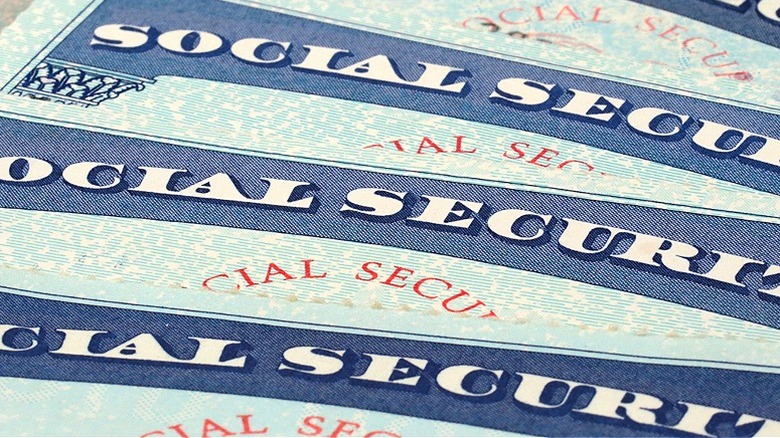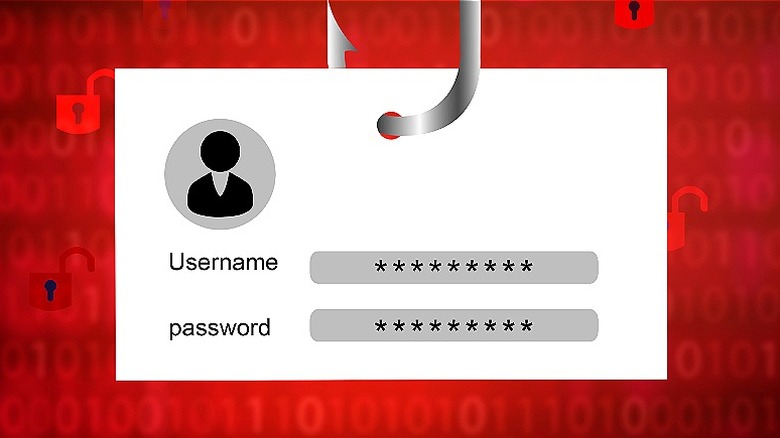Social Security Scams: How To Spot Them And Avoid Them
It's a miserable fact of life, but where there is money there will always be thieves trying to take it from people. A century ago, there were highway bandits and bank robbers, today, scammers and con artists work to trick honest people out of their money through digital channels and via sophisticated ruses. For as long as Social Security benefits have been paid out to retired Americans (in 1937), there have been bad actors trying to access money they're not entitled to. Most scams nowadays focus less on governmental institutions as a result of database information and connected computer systems that make lapses in catching illicit behavior rarer. This means scams targeting Social Security focus on lifting them from beneficiaries directly — it's your wallet that's affected, not the government's!
Fortunately, with a trained eye, it becomes a little easier to spot scammers and protect your bank account and personal information. These Social Security scams all follow the same basic patterns, but they can be presented in varying degrees of complexity, making each scammer's approach somewhat unique. This said, they still suffer from the same weaknesses inherent to any fraudulent activity in the confidence racket: Scammers need your assistance to take money away from you. So, staying hip to the methods employed today gives you a key leg up in this fight to protect yourself.
Fake card replacement scams
One of the simplest approaches scammers take with both Social Security beneficiaries and those still working centers on stealing information rather than money. You may receive a phone call, text, email, or even letter in the mail stating that your Social Security card needs to be replaced for some reason. It may be due to being "compromised" in some way, or scammers might simply claim you need a new one issued every few years and yours is due for a renewal. You may also stumble across services on the internet that purport to offer this service.
Whatever the reason given, it's important to know that your Social Security card never needs to be replaced like this. If you lose or damage yours, you can ask for a replacement, but the Social Security Administration will never mandate you get a new one and reach out to you. The issuance of a new Social Security card is wholly initiated by the cardholder, not the government.
Scams of this nature may look to impose a fee on cardholders. You'll be charged something to get your new card expedited or printed in the first place, only to see the new document never arrive. Fees for this kind of "service" need to sit within the realm of possibility in order to ensnare unsuspecting victims. Therefore, the main target of these frauds is generally the personal information gathered rather than the cash.
Paying via debit or credit card will allow a scammer to capture your card details, and of course, in order to get a new Social Security document you'll have to provide your Social Security number, a sensitive personal detail that scammers can then use to open new credit in your name when paired with some of the other captured information.
Overpayment mistakes that require your action
In this Social Security scam, scammers will sometimes initiate contact and claim that they've made a calculation error, paying you too much. As a result, they now "want it refunded" and will potentially threaten to send the authorities to arrest you if you don't make good on this discrepancy immediately.
There are a few things to keep clear here. First, any overpayment discrepancy that could possibly happen isn't your fault. If the Social Security Administration managed to overpay you, that would be a calculation error on the agency's part, not criminal activity on yours. Therefore, the threat of police involvement should immediately be met with skepticism. And even if you've somehow managed to fraudulently collect Social Security benefits intentionally, the government wouldn't contact you, it would investigate and then act.
Remember, any threat of police involvement is an empty one. If something you did was illegal, the government wouldn't be interested in giving you the opportunity to correct it; instead, you'd simply have the cops knocking on your door. Scammers threaten legal consequences because they know it strikes fear into their victims. However, these ring hollow if you're able to take a step back and really consider the information you're getting from the other end of the call. The dead ringer happens right after the threat; they often want you to repay the discrepancy in gift cards purchased at your local Walmart or CVS. (On that note, here's how scammers target the country's most vulnerable.)
Benefit suspension threats
This one is a little more aggressive, formed on the basis of an underlying threat. While Social Security scammers seeking to "give you a new card" will try to set a helpful tone, those threatening the suspension of your benefits often strike a more menacing balance.
It's important to know your benefits could be suspended if you start working again and make too much money, and may temporarily be halted if you find yourself incarcerated. But the avenue by which these changes take place is completely different. The Social Security Administration will generally send you a letter outlining the change that will occur, as well as provide you with plenty of warning before the action takes effect. You won't receive a threatening phone call suggesting that your benefits are now suspended — or will be by the end of the call unless the caller gets the information they need.
Threats and immediacy aren't in the Social Security Administration's playbook. Rather, the public servants working behind the scenes will work with you to resolve any kind of issue you might be facing, usually with respect and always with the professionalism draped over any interaction with a governmental agency. Often, benefit suspension threats are aimed at stealing money from you. They may ask you to pay a fee to resubmit forms, eliminate penalties, or reissue checks. There's always the information-gathering component, though. Even if you don't fork over any money, be wary of providing your Social Security number and the like to anyone cold calling you. (Here are money scams to watch out for in 2024.)
Phishing emails
Phishing is a serious problem across all areas of sensitive information and personal finance. Whether it's an attack on your work email and corporate data infrastructure or an attempt to capture Social Security numbers and bank details, phishing should be a major concern for all Americans. Stolen credentials siphoned off through phishing scams stand as the primary cause of data breaches today, according to Verizon's 2024 data breach investigation report, and their volume is staggering, with ~3.4 billion spam emails sent to potential victims on a daily basis (per cybersecurity training company StationX).
Attempts to steal your information through phishing attacks can be incredibly sophisticated, with multiple layers of thought put into the approach. Victims may get emails seemingly from the Social Security Administration with attachments that look virtually identical to the kinds of correspondence you might actually receive from the real thing. They might include seals and watermarks as well, if the scammers are particularly skilled. However, the Social Security Administration will never seek to confirm or collect personal information through correspondence like this. Moreover, legitimate contacts never seek to agitate or threaten recipients.
You won't receive emails from the real Social Security Administration asking for your number, personal details, or passwords. If the correspondence seems to contain a call to action, don't follow the request, especially if it's alarmist in nature or seems to threaten action if you fail to do something. It's worth asking yourself, too, if the action requested is objectively good for you and your finances. As a baseline mindset, handing over any money or giving someone personal details doesn't provide you with a positive outcome. If the change appears to be something that moves the needle in a negative direction, consider calling Social Security directly to verify the request.
The 'pay to increase your benefits' scam
One final Social Security scam involves the cost-of-living adjustment, or COLA, that takes place each year. Social Security benefits are adjusted annually via COLA to account for inflation, and this change is made automatically, without recipients having to do anything. Even so, contact from scammers sometimes focuses on this change, and offers to "increase your benefits" in exchange for a payment of some kind. Often, this is a fee to make the adjustment, but it can also come in a slightly different format.
Some scams in this realm take the approach of investment opportunities. That is, paying into some kind of fund offered by the scammers promises an increased return that ultimately never comes — or takes the form of the COLA increase that would have been added to your checks regardless of what you choose to do with the benefit. There are ways to increase your Social Security benefit, but they involve active decisions that you make. There's no investment option or payment you can make to improve your Social Security checks.





